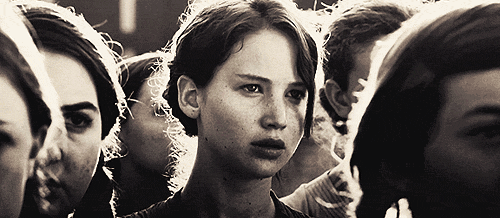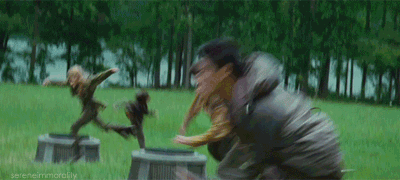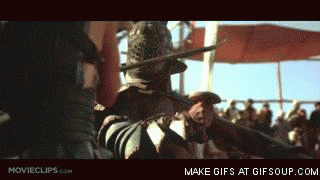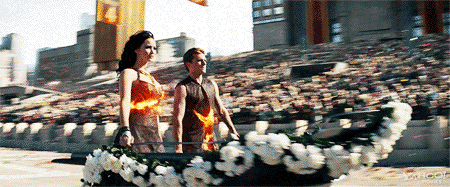The
Hunger Games vs. Real World
The
Hunger Games, written
by Suzanne Collins, is a book written to explain the events that
occurred during the annual Hunger Games. The book was not just about
explaining the games though. It also brings up many negative aspects
and ideals of the human race. Some of those aspects that were
thoroughly referenced throughout the book are tyrannical,
totalitarian governments and the mistreatment of the people. Katniss,
the main protagonist, describes the state of Panem as oppressive and
cruel. The 12 districts of Panem are treated harshly by the capitol.
They are unable to speak out against the government, aren’t given
enough food and necessities, and are of course forced to send
tributes to participate in the Hunger Games annually.
 |
| Hunting for game, to keep the family alive another day or two. |
In the book,
Katniss regularly ventures out to the forbidden woods behind fences
to hunt food, because the Capitol wouldn’t give enough food to feed
the populous. Barely able to support her own family, Katniss
describes her District 12 as “The place where you can starve to
death in safety” (Collins 7). Katniss also describes how everyone
tries to avoid speaking about the district and the Capitol, as this
only leads to trouble (Collins 7). She said, “When I was younger, I
scared my mother to death the things I would blurt out about District
12, about the people who rule our country, Panem, from the far city
called the Capitol. Eventually I understood that this would only lead
us to more trouble” (Collins 7). Mistreatment by the government of
Panem was a result of a revolt that occurred between the districts
and the Capitol. To prevent anything like that from happening again,
the government became harsher and manipulative.
The Hunger Games are
meant to pose terror to the people from ever acting out against the
governments again. The people are manipulated into thinking that the
games are for sacrifice and honor to the state. Harsh penalties will
be faced for opening your mouth about the games or the rulers of the
country.
 |
| Katniss Everdeen's sister Primrose, was reaped on the 74th Hunger Games. |
In
the real world, there are cruel totalitarian governments like the one
from Panem. Examples of similar real life totalitarian governments
are North Korea, China, the former Soviet Union, and many more. These
countries are ruled by tyrannical leaders who oppress, torture, and
manipulate the vulnerable populous. Citizens of those countries have
little to no human rights and are completely at the mercy of those
who govern, just like in the book.
 |
| North Korean guards. |
The
communist regime of North Korea can be regarded as the closest
real-life representation of the Hunger Games. Along with the evil
government that reigns supreme over the people, North Korea is among
the poorest and least advanced countries in the world. According to
Joshua Stanton and Sung-Yoon Lee of The
New York Times, with
the leaders of that country squandering money on luxury goods and
strengthening the military, many of the inhabitants of the state are
left struggling to find food and are starving to death in the
thousands. They are malnourished, the children have stunted growth,
and in the last 2 decades, death from starvation reached the millions
in North Korea. The novel gives a fictional, less cruel viewpoint on
starvation. The twelve districts struggle to find food to survive
through the days. Katniss describes that starvation is not an
uncommon rate in her district, and that people can’t work and
slowly starve to death. In her own words she states,” Starvation is
not an uncommon fate in District 12. Who hasn’t seen the victims?
There are older people who can’t work. There are children from a
family with too many to feed. Those injured in the mines. Straggling
through the streets” (Collins 29). She herself was a victim of
starvation, only saved when Peeta Mallark, one of the other
protagonists, was willing to feed her. To provide enough for her
family, she illegally hunts games and offers to put her name more
times in the reaping of the Hunger Games for tesserae, a year’s
supply of barely enough food. Katniss quotes, “You can opt to add
your name more time in exchange for tesserae. Each tessera is worth a
meager year’s supply of grain and oil for one person. You may do
this for each of your family members as well” (Collins 14). This is
the Capitol trying to lure them into getting chosen for the Games, a
sign of a manipulative government.
 |
| North Korean tyrant Kim Jong Un and his trusted advisors. |
While
citizens of North Korea suffer, the communist leaders live the most
lavish lifestyle as they can. Their dictator, Kim Jong Un, is said to
have spent 1.3 billion dollars on luxury items, and military projects
(New York Times). Kim Jong Un lives like a king while his people
suffer.
 |
| Citizens of District 12. |
 |
| North Koreans struggle to survive everyday while Kim Jong Un lives a lavish lifestyle. |
He lives atop a net worth of five billion dollars while his
own people decay with an annual salary of little more than a thousand
(Head). In the districts the heavily poor live in horrible
conditions. The government mostly ignores the well being of the
districts. As described in the novel, the Capitol (the place where
the government resides), is a utopian society that is extremely
wealthy, technologically advanced, and where fashion and style are
key to being relevant (Collins 59).
 |
| The spoiled people of the Capitol. |
There is a huge gap in the human
quality of life between the districts and the capital. The people of
the districts are living in slum-like villages and are on the verge
of starvation every day, while the upper-class people of the capital
live in rich, spacious houses and eat endlessly, even resorting to
special liquids to make them vomit and able to eat more. The reality
of totalitarian rule is that it brings out the “most selfish” of
the aspects of order, where majority of the common people are pawns
in the ruling elite’s games to achieve wealth and luxury.
Suffering
doesn’t just come from the ignorance of the governments to the
common people. As stated earlier, the novel’s Hunger Games were
meant for keeping control of the districts. But it also served to the
ruling class of the capitol as something they can watch and be
entertained with. The games were broadcasted live to everyone in
Panem, including the districts. To the Capitol, it was like watching
a sport, as the people would keep a close eye on the games, watching
every tribute’s move, while also routing for their favorites. The
polar opposites were the districts, who broadcast the games as
torture and cruelty. The suffering already started before the games.
It was a drama already when people of the Capitol were cheering as
tributes stepped out of the train that transported them to the ruling
city. For Peeta and Katniss, as they leave the train, both were
shocked and disturbed at the cheering crowd. Even as death looms
among them, the crowd has the audacity to smile and cheer.
 |
| Running away from the Cornicopia or just running to the slaughter. |
 |
| Entertaining the crowd of Rome was difficult. |
Katniss
describes the crowd as she sees the crowd when first arriving at the
Capitol, “I step away from the window, sickened by their
excitement, knowing they can’t wait to watch us die” (Collins
59). Their suffering officially began there, as they suffer to hide
their fears and weaknesses before the games. In the days of the
ancient Roman Empire, tyrants legalized suffering for entertainment.
 |
| Fight to the death. From the 2000 film Gladiator. |
The most popular brutal events were the gladiator games. Gladiators
were mostly enslaved people or prisoners who have little rights and
privileges (Futrell 130), very much like the novel’s district
citizens who are at the mercy of the Capitol. Much like tributes in
the novel, Gladiators engage in battles to the death, always in front
of a bloodthirsty crowd. The gladiators’ guides were the magistri,
former gladiators with experience in the gladiator games, very much
like mentors for the tributes in the novel (Futrell 138). There was
an enormous amount of combat training for gladiators, as they
exercise for hours on end for years, while also learning how to
prepare to die. However, in the Hunger Games, two weeks were only
allowed for training and preparing, but they were almost as intense
during that time.
In
the Hunger Games, popularity was necessary to survive, because it can
result in more sponsors giving you the necessities you need during
the games. That can ultimately decide your fate in the games. Katniss
and Peeta were able to get sponsorship for pretending to be a couple
fighting in the games, which made them popular and able to secure
sponsors and favorable views. That contributed greatly to their
victory in the 74th
Hunger Games.
 |
| Mentor Haymitch giving a basic advice to Katniss. |
Popularity in the Gladiator games was necessary in a
different way for the Gladiators. If a gladiator achieves popularity
within the games, it serves as a bailout from death. Should one who
was loved by the crowd get wounded to the point where they are barely
alive and no longer able to fight, the crowd can decide if the
gladiator can live or die (Futrell 143). Unlike the Hunger Games, the
whole crowd is the sponsor. The majority of the crowd holds lives in
their hands.
 |
| Emperor Commodus of the Roman Empire - from the 2000 film, Gladiator. |
In
all, the Hunger Games brings mind what government can do if it isn’t
controlled itself, by the vast majority. Brutality, mistreatment, and
manipulation prevail in a country where most do not have their human
rights and freedoms. Ruling elites live a lavish lifestyle while
citizens decay in harsh environments. Having too much power corrupts
a society and the Hunger Games clearly portray that. What is also to
learn from the novel is the violent nature of humans. Violence and
brutality serve as entertainment for some of us in world and leaves a
negative mark on the human race.
Works
Cited
Collins,
Suzanne. The Hunger Games. New York: Scholastic, 2008. Print.
Futrell,
Alison. The Roman Games: A Sourcebook. Malden, MA: Blackwell
Pub., 2006. Print
Head,
Tom. "What Are the Human Rights Violations in North
Korea?" About. N.p., n.d. Web. 25 Oct. 2014.
<http://civilliberty.about.com/od/internationalhumanrights/p/northkorea101.htm>.
Stanton,
Joshua, and Sung-yoon Lee. "Pyongyang’s Hunger Games." The
New York Times. The New York Times, 07 Mar. 2014. Web. 27 Oct. 2014.
<http://www.nytimes.com/2014/03/08/opinion/pyongyangs-hunger-games.html?_r=0>.
.














No comments:
Post a Comment